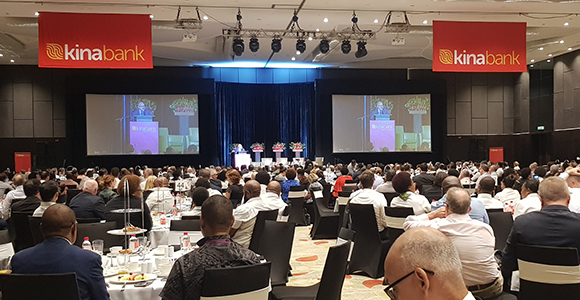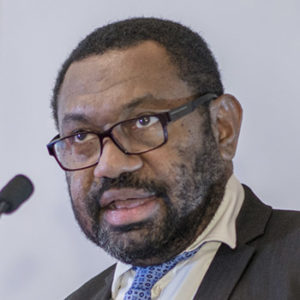Last month, the Papua New Guinea Government tabled the Foreign Investment Regulatory Authority Bill in Parliament. What is the bill designed to achieve and why is the business community concerned? Business Advantage PNG investigates.

Business gathers at the Prime Minister’s Back to Business Breakfast in Port Moresby last week
The Foreign Investment Regulatory Authority Bill, if passed into law, would substantially change the regulatory framework for foreign investment in Papua New Guinea.
It would
- establish a new Foreign Investment Regulatory Authority to regulate, certify, license and monitor all foreign investment in PNG (effectively taking over these functions from PNG’s Investment Promotion Authority)
- reserve all investment below K10 million for PNG citizens and ‘national enterprises’ (ie enterprises more than 50% PNG-owned)
- give non-compliant foreign-owned businesses a three-year ‘transitional period’ from the enactment date of the Act, after which they will have to cease doing business
- substantially expand the number of business activities that can be conducted only by PNG citizens and national enterprises
The encouragement of nationally-owned small-and-medium sized businesses (SMEs) is government policy, and its development plans having a stated goal of eventually reaching 500,000 SMEs.
Speaking in support of the Bill last month, Minister of Commerce and Industry Wera Mori said, ‘We intend to give some breathing space to local entrepreneurs who are trying their best to thrive, whilst at the same time being outmanoeuvred by foreigners.’
Surprise

The Business Council of PNG’s Robert Nilkare
The tabling of the Bill caught business by surprise, however, the Presidents of the Business Council of PNG and the PNG Chamber of Commerce and Industry wrote to the Prime Minister Peter O’Neill in late January expressing concern at the lack of consultation and warning that the proposed changes ‘will likely trigger a significant collapse of our economy’.
Speaking at a business breakfast in Port Moresby last week, Business Council President Robert Nilkare stated, ‘the Bill does not consider the market reality of SMEs where they are thriving with joint foreign ventures.
‘Growth has to be inclusive. Papua New Guineans must have every chance at growing their businesses. We cannot wait any longer.’
‘The most sensible way to bring breathing space for our SMEs, is to enhance and protect domestic industry and in particular SMEs that are injured because of dumping, unfair trade subsidies from importers or normal competitive trends.’
Review
Responding to these concerns at the same meeting, Prime Minister Peter O’Neill indicated the Bill would be reviewed.
‘The proposed legislation is about empowering our people and giving them fair protection.
‘These reforms are not about genuine and large scale investments in the country, that bring expertise, train our people and drive our country,’ he said.
‘Our members would prefer to see the law as it stands enforced—including the paying of correct taxes and wages’
‘I want to assure the business community that we will work with you to ensure this is fair and functional and certainly doesn’t disadvantage current and future investors.’
Nevertheless, he indicated that the Bill, with any amendments, would be presented to the May sitting of Parliament.
‘Growth has to be inclusive. Papua New Guineans must have every chance at growing their businesses. We cannot wait any longer.’
Consultation

PNGCCI’s John Leahy
John Leahy, President of the PNG Chamber of Commerce and Industry, told Business Advantage PNG that he was hopeful of a genuine consultation with business about the reforms, to be led by Treasurer and Deputy Prime Minister, Charles Abel.
He said the K10 million threshold was a serious concern, as it would prevent PNG accessing the best skills from overseas.
‘Our members would prefer to see the law as it stands enforced—including the paying of correct taxes and wages,’ he said.
Nevertheless, he did see room for compromise: ‘I don’t think the government’s intention is as draconian as it seems.’
‘It’s true that some overseas micro and small investors and workers may have displaced Papua New Guineans in some jobs around the country … This needs to be firmly addressed,’ notes Paul Barker, Executive Director of PNG’s Institute of National Affairs.
‘The proposed new list greatly expands the number of business activities that can only be conducted by PNG citizens and majority PNG-owned enterprises’
‘But far more jobs are generated by foreign investment than are forfeited, so one must avoid throwing the baby out with bathwater. PNG SMEs are not being created because of the presence of foreign investment, but because of poor investment conditions.
‘Imposing widespread investment restraints on foreign business won’t generate local business.’
Reserved Activity list
The Reserved Activity List itself is not a new concept. The 1992 Investment Promotion Act contains the Cottage Business Activities List, but the restricted activities therein are largely traditional ones, and of low value. Under PNG’s Mining Act, alluvial mining is also already reserved for businesses with majority PNG ownership.
In 2016, then Minister for Trade, Commerce and Industry Richard Maru flagged the expansion of the reserved activities list to support SME development.
The proposed new list greatly expands the number of business activities that can only be conducted by PNG citizens and majority PNG-owned enterprises.
Peter O’Neill told business last week that the Reserved Activity List would be phased out eventually, once a Foreign Investment Review Board had been established.








Speak Your Mind